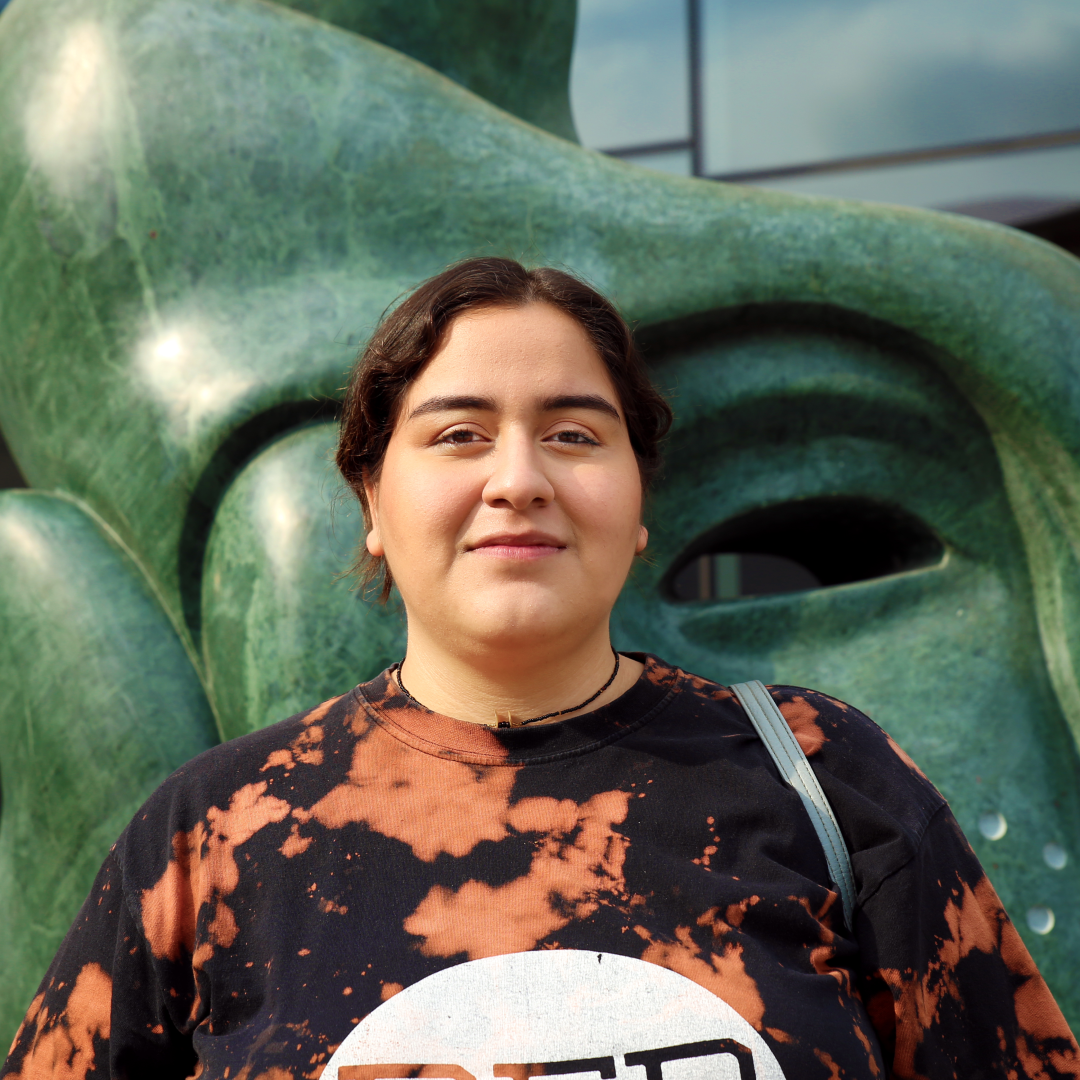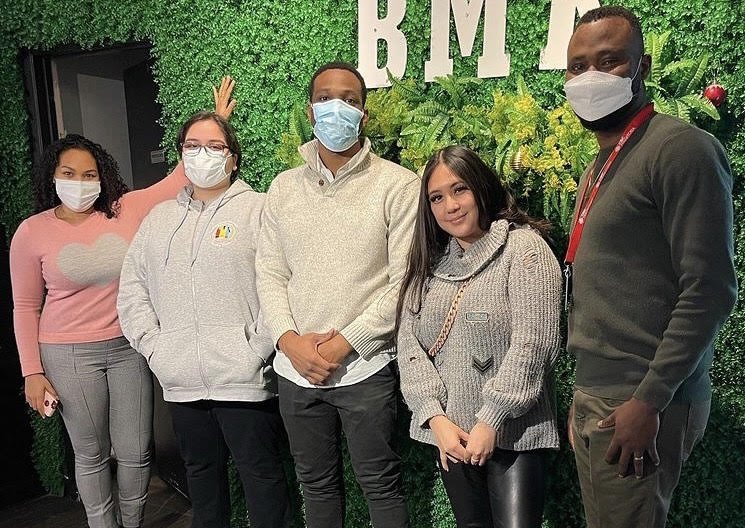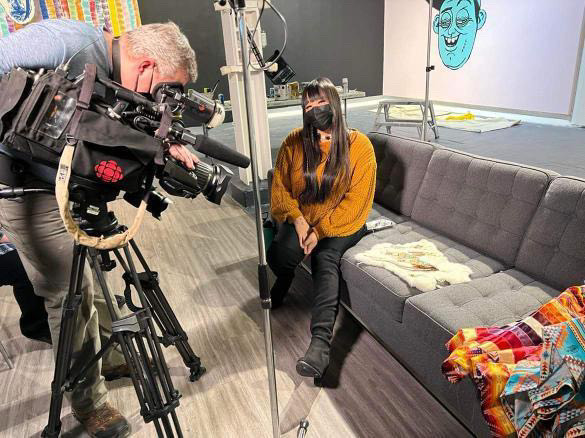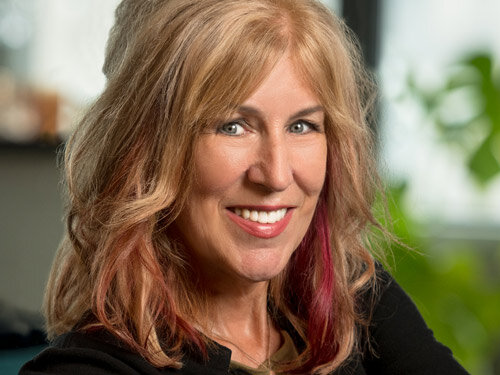
MFA in Writing Student Explores New Avenues of Storytelling with the CBC Manitoba Pathways Program
MFA in Writing student Özten Shebahkeget speaks about her Cinderella story of getting into the CBC Manitoba Pathways program and the experiences she has had in the program thus far.
Özten Shebahkeget, a current student in the MFA in Writing program at the University of Saskatchewan is now halfway through her placement in the CBC Manitoba Pathways program. The Pathways program is an opportunity for BIPOC individuals to receive training and experience in a CBC newsroom. For more information about the program, please visit: https://www.cbc.ca/news/canada/manitoba/cbc-manitoba-pathways-1.6225036.
Now halfway through the program, Özten was kind enough to answer some questions.
Q: So, to start things off, I’ll admit that I’ve tried to find your bio online and haven’t had much luck. I know that you were born and raised in Winnipeg and that your parents are from Girne, Cyprus, and Northwest Angle 33A First Nation. But I’m hoping you can expand and tell me how you got into writing. What are your favourite things to write? What inspires you?
A: I started to think about becoming a serious writer when I was 15. Reading and writing were my favorite things to do since I was a child, and many of my high school English teachers would tell me that they were impressed with my writing. I ran the idea of pursuing an English degree to a few people in my life at that time, but became discouraged by the common response of “What kind of job are you going to get with that?”
When I was 17, I was in a program at my high school for Indigenous youth, and they took us to the Aboriginal Film Festival at the University of Winnipeg. There was a guy who spoke to the audience for a long time, and he said that we all have our own gifts and purposes in life. He looked around the room and said: “Someone in this room is going to be a doctor, someone’s going to be a teacher,” and then he said: “Someone here is going to be a writer, and they’re going to write some nice stories for us.” Alarm bells went off in my head when he said that, and I thought: “That’s me!” I decided then and there that I was going to be a writer and not let anyone stop me from chasing my dreams again. Looking back, it was a crazy ambitious thing to do at 17, but I strongly believed in myself and I’m glad I did.
Q: You’re currently pursuing an MFA in Writing after getting a bachelor’s of English from the University of Winnipeg. When do you anticipate being done the MFA program? Can you tell us more about your thesis project?
A: [Özten plans to defend her thesis this year but exact dates are still to be determined]. My thesis is a speculative verse novel set primarily at the Manitoba Legislative Building. The idea for it came after I read Frank Albo’s book called The Hermetic Code: Unlocking One of Manitoba’s Greatest Secrets, which examines the antiquity of the Legislative building’s architecture. It was also heavily inspired by Louise Halfe’s poetry collection awâsis and the ancient epic Gilgamesh. I spent six months working on the first draft with my mentor Katherena Vermette last summer, which was a once in a lifetime experience. I was in high school when North End Love Songs came out and witnessing Katherena’s success was so inspiring and encouraging.
Q: You’re currently part of the CBC Manitoba Pathways program, training to become a reporter/journalist. How did you make the jump from poetry to journalism?
A: Creative nonfiction was initially my genre of choice, and I joined the MFA program with the hopes of writing a memoir, but becoming a journalist was never something I thought possible.
I had some poetry publications under my belt when I joined the MFA program, but I didn’t begin to call myself a poet until after I joined. It took some nudging from Jeanette and Sheri to even consider pursuing a poetry thesis. I decided to go for it after taking Sheri’s poetry workshop, which was an incredible experience. I was also taking Sheri’s creative nonfiction workshop when I joined the Pathways program, which I am grateful for, because it showed me the wide range of possibilities with journalism.
Q: What led you to the CBC Pathways program? Has the desire to be in journalism always been there for you or is it something new that you’re exploring?
A: The desire is relatively new. I never saw anyone like me on the news growing up, so the possibility of becoming a journalist didn’t occur to me. I had some prior experience with journalism – I wrote a couple of articles for a non-profit organization’s newsletter earlier last year and enjoyed the experience. Serving as Interviews Editor for River Volta Review of Books last year also further prepared me for the gig.
The program is a pilot project for BIPOC storytellers to gain experience in journalism. I saw the ads for the program when they came out, but I didn’t think it was for me at first. Lenard Monkman, an Associate Producer for CBC Indigenous, encouraged me to apply, and he helped me out a lot with the application process. He changed my life.
The application process kind of felt like a Cinderella story. I submitted my application and was surprised when I learned that I had made the shortlist. I was one of twelve selected out of over a hundred applicants from across the country. I went into the interview not expecting that I would get it, because I have applied for things in the past and was disappointed when I wasn’t chosen, so I was able to be 100% myself in the interview when I let those expectations go.
.jpg)
Q: What can you tell us about the program so far? I know that you mentioned every day is different – what have been your favourite moments? Has there been any eye-opening experiences?
A: The program started in December, and we spent the entire month in training. Now, we are spending two weeks working in each platform. I have worked in web, current affairs, and right now I’m working on my first TV story. I will end February working in radio, and then I will spend March and April working as a full-on reporter.
The wildest day yet was when I shadowed Sam Samson, CBC Manitoba’s City Hall reporter, in the newsroom. She is one of my favorite CBC reporters, so it was really cool to meet her. I got to watch her shape a story and get it ready for radio, TV and web throughout the day. It was an eye-opening experience because of how quickly reporters have to work. Sitting in the newsroom was also quite mind-blowing, as I was sitting among reporters that I have known of for a while.
A couple of my first web stories were picked up by CBC Entertainment, CBC Indigenous, and CBC Thunder Bay. Those were probably my favorite moments so far because they were pieces that I enjoyed writing.
Q: If you had to compare two drastically different days in the program, what would they be? What would you say has been the biggest learning experience for you thus far in the program?
A: Working in web and current affairs were two different experiences. In web, I was doing a lot of writing and research. In current affairs, I was working as an Associate Producer, and I was pitching and chasing stories for the various local radio shows. I was pre-interviewing new and interesting people every day, and the writing was a lot different than with web because it needed to be conversational. I had to beat six and half years of academia out of myself to be able to do it, but I enjoyed the challenge.
The biggest learning experience so far has been learning to trust myself and when to take breaks. It can get stressful, especially while working on my MFA at the same time, but to be in this position at 25 years old is something I could have never imagined in my wildest dreams. I decided that I wanted to be a stronger writer when I was 15, and there were many times when I thought it would never pay off, so I’m also learning to remember to celebrate my achievements.

Q: You’re almost halfway through the internship if I’m calculating right. What are your plans for when it’s over? Would you recommend the Pathways program to others?
A: Yes, we are halfway through the program now. There is a possibility that I could get hired following the program, but again, I am going through this experience without expectations. Working at CBC Manitoba has allowed me to further prove my capabilities as a writer, and it has shown me that I can do anything I set my heart on.
I would definitely recommend the Pathways program to others. Me and my cohort were welcomed into CBC Manitoba with open arms, and we’ve been given so much support from everyone. There’s never been a program like this at CBC Manitoba, so it sometimes feels like we’ve won the lottery.
Q: Working as a reporter in training, are you able to make time for personal projects? If yes, do you have any advice for others who are trying to juggle a career and follow their personal creative projects?
A: I’m mostly working on my poetry thesis right now. It can get difficult while working full-time, but I would advise others to try and set aside a chunk of each day, no matter how big or small, and devote it solely to their personal creative projects.
Q: What influences you most in your writing? Do you find that your influences and inspirations are similar in your own writing and your reporting? Does your family heritage and your own lived experience play into both avenues?
A: I struggled to get my writing published as a new undergrad. I think it was because I was trying to write like I was someone else, like I wasn’t me. It wasn’t until I got comfortable with myself that my writing started to get noticed. Learning to speak Anishinaabemowin and beginning my healing process as an intergenerational residential school survivor also strengthened my sense of identity and what I wanted to write about. My work is largely inspired by my language, nature, and by my people. I don’t have a favorite genre to write in, but I love to write for other Indigenous people who are trying to survive in this world.
Q: How has COVID influenced your writing practice? Do you think the internship would have been different if we weren't living during a pandemic at the same time?
A: I’m a bit of a recluse at heart, so COVID hasn’t really changed my writing practice, although one of my COVID-anxiety poems made it into an issue of Prairie Fire. If we weren’t living in a pandemic, then I would be in Saskatoon and joining the Pathways program likely wouldn’t have been possible. So I am thankful that it worked out, despite the turmoil of living and working through a pandemic. We were sent home in the third week of December due to rising Omicron cases, and while I love to work from home, I do miss seeing my cohort in person. They make the experience a lot more fun, and I learn so much from them.
Q: Is there any other information that you want to share?
A: The MFA in Writing program did a great job of preparing me for Pathways. The program has shaped me into a more thoughtful and creative writer, and I’m grateful for Jeanette and Sheri’s support.
Thank you Özten Shebahkeget for the great answers and for sharing this experience!
